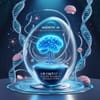Artificial intelligence has already made significant strides in areas like language processing and image recognition, but now researchers are turning to AI to tackle one of the most intricate and fascinating challenges: understanding complex biological systems. With the help of agentic AI, which refers to autonomous systems capable of making decisions and taking actions, scientists are uncovering new insights into how biological systems work—insights that could lead to breakthroughs in medicine, ecology, and biotechnology.
Biological systems, whether at the level of individual cells or entire ecosystems, are notoriously difficult to study. They involve an immense amount of data—much of which is highly variable and interconnected. Traditionally, understanding these systems has been a slow, painstaking process, requiring manual data collection, analysis, and a lot of trial and error. But with the rise of agentic AI, researchers are now able to simulate complex biological environments and run experiments at an unprecedented speed and scale, providing new opportunities to uncover hidden patterns and relationships.
Agentic AI goes beyond traditional machine learning models by having the ability to interact with and change the systems it is studying. It’s not just analyzing data—it’s actively testing hypotheses, proposing new experiments, and making decisions on how to move forward. This ability to self-direct allows AI systems to explore possibilities in biological research that human scientists might not have considered. Whether it’s identifying the cause of a disease, exploring genetic pathways, or understanding how different species interact within an ecosystem, agentic AI opens up new avenues for discovery.
The promise of agentic AI in biology is vast. For example, in drug development, these AI systems could help identify potential treatments more quickly by simulating how molecules interact within the human body. In ecology, agentic AI could be used to model environmental changes, helping scientists predict the effects of climate change on ecosystems and biodiversity. Even in personalized medicine, AI could eventually assist in tailoring treatments to individual genetic profiles, revolutionizing the way we approach healthcare.
However, as with any emerging technology, there are challenges. For one, the complexity of biological systems means that even the most advanced AI models are still limited in their understanding. Agentic AI can propose hypotheses, but it doesn’t yet have the ability to fully replicate the nuances of living organisms. There are also ethical considerations, such as ensuring that AI-driven experiments respect biological integrity and are used for the benefit of society as a whole.
The potential of agentic AI to transform biology is clear. By allowing researchers to simulate, experiment, and learn at scale, AI could revolutionize fields from drug discovery to environmental conservation. As technology continues to advance, the relationship between AI and biology is likely to become even more intertwined, offering new insights and possibilities that could change the future of medicine, science, and sustainability.


